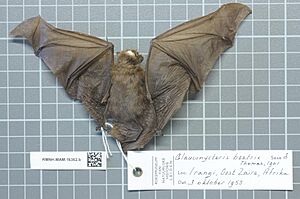Beatrix's bat facts for kids
Quick facts for kids Beatrix's bat |
|
|---|---|
 |
|
| Conservation status | |
| Scientific classification | |
| Genus: |
Glauconycteris
|
| Species: |
beatrix
|
| Synonyms | |
|
|
Beatrix's bat (Glauconycteris beatrix) is a small, interesting type of bat. It belongs to a group called vesper bats. You can find these bats living in warm, wet forests across several countries in Africa. These include places like Angola, Central African Republic, Democratic Republic of the Congo, and Nigeria.
Contents
About Its Name and Discovery
How Scientists Name Animals
Scientists have special ways to name and group animals. This is called taxonomy. Beatrix's bat was first officially described in 1901. A British scientist named Oldfield Thomas gave it its name.
Where the Name "Beatrix" Comes From
The first bat specimen used to describe the species was found in 1898. It was collected by George Latimer Bates near the Benito River in what was then the French Congo. The scientist Oldfield Thomas did not say why he chose the name "beatrix." However, some people think he named it after Princess Beatrice.
What Beatrix's Bat Looks Like
Beatrix's bat is a small bat. It has dark brownish-black fur. Its flight membranes, which are like its wings, are all brown. This bat has a wide snout (nose area). It also has short, wide structures in its ears called tragi. Its forearm, which is part of its wing, is about 39 millimeters (1.5 inches) long.
Where It Lives
Beatrix's bat lives in several countries in West and Central Africa. You can find it in places like Angola, Cameroon, Central African Republic, Congo, The Democratic Republic of the Congo, Ivory Coast, Equatorial Guinea, Gabon, Ghana, and Nigeria. These bats prefer to live in tropical lowland forests. These are warm, wet forests that are not high up in the mountains.
Conservation Status
As of 2017, the IUCN (International Union for Conservation of Nature) says that Beatrix's bat is a least-concern species. This means that scientists believe this bat is not currently at risk of disappearing. Its population is stable, and there are enough of them in the wild.


